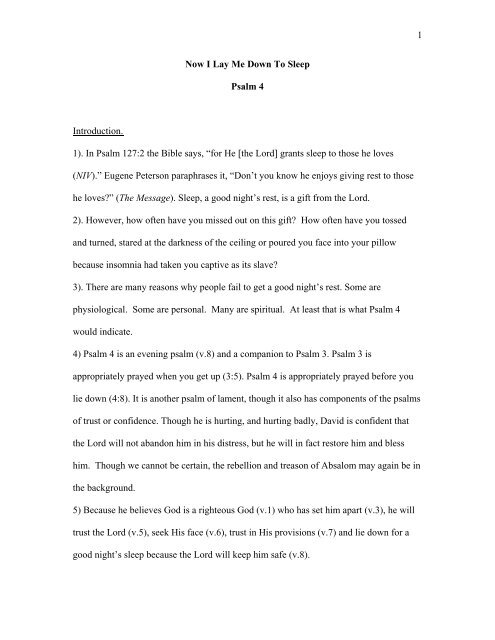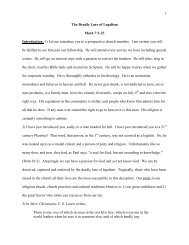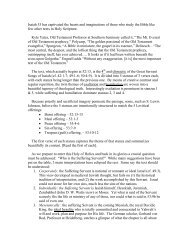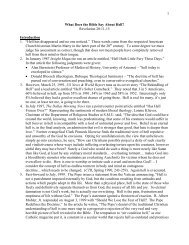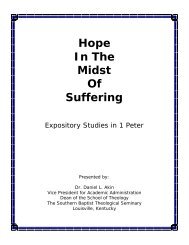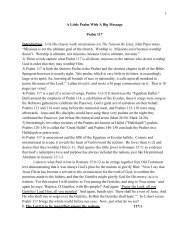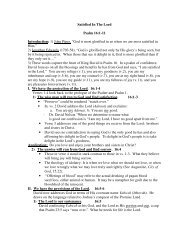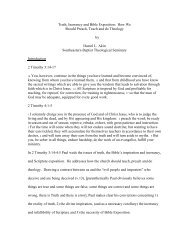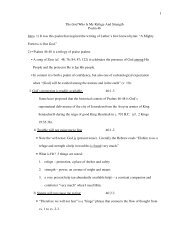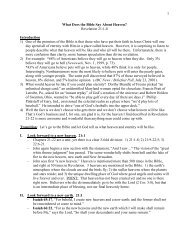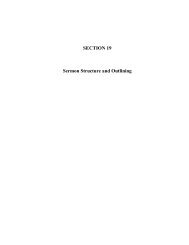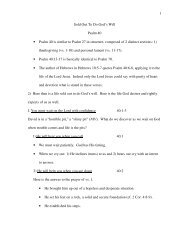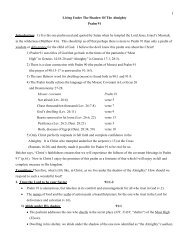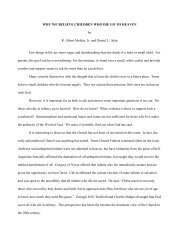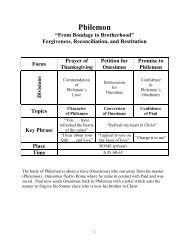1 Now I Lay Me Down To Sleep Psalm 4 Introduction. 1 ... - Daniel Akin
1 Now I Lay Me Down To Sleep Psalm 4 Introduction. 1 ... - Daniel Akin
1 Now I Lay Me Down To Sleep Psalm 4 Introduction. 1 ... - Daniel Akin
Create successful ePaper yourself
Turn your PDF publications into a flip-book with our unique Google optimized e-Paper software.
<strong>Introduction</strong>.<br />
<strong>Now</strong> I <strong>Lay</strong> <strong>Me</strong> <strong>Down</strong> <strong>To</strong> <strong>Sleep</strong><br />
<strong>Psalm</strong> 4<br />
1). In <strong>Psalm</strong> 127:2 the Bible says, “for He [the Lord] grants sleep to those he loves<br />
(NIV).” Eugene Peterson paraphrases it, “Don’t you know he enjoys giving rest to those<br />
he loves?” (The <strong>Me</strong>ssage). <strong>Sleep</strong>, a good night’s rest, is a gift from the Lord.<br />
2). However, how often have you missed out on this gift? How often have you tossed<br />
and turned, stared at the darkness of the ceiling or poured you face into your pillow<br />
because insomnia had taken you captive as its slave?<br />
3). There are many reasons why people fail to get a good night’s rest. Some are<br />
physiological. Some are personal. Many are spiritual. At least that is what <strong>Psalm</strong> 4<br />
would indicate.<br />
4) <strong>Psalm</strong> 4 is an evening psalm (v.8) and a companion to <strong>Psalm</strong> 3. <strong>Psalm</strong> 3 is<br />
appropriately prayed when you get up (3:5). <strong>Psalm</strong> 4 is appropriately prayed before you<br />
lie down (4:8). It is another psalm of lament, though it also has components of the psalms<br />
of trust or confidence. Though he is hurting, and hurting badly, David is confident that<br />
the Lord will not abandon him in his distress, but he will in fact restore him and bless<br />
him. Though we cannot be certain, the rebellion and treason of Absalom may again be in<br />
the background.<br />
5) Because he believes God is a righteous God (v.1) who has set him apart (v.3), he will<br />
trust the Lord (v.5), seek His face (v.6), trust in His provisions (v.7) and lie down for a<br />
good night’s sleep because the Lord will keep him safe (v.8).<br />
1
Transition.<br />
What then do we need to learn from this psalm that we too many enjoy God’s gift of a<br />
good night’s rest?<br />
I. Remember: God Answers the Prayers of Hurting 4:1<br />
David is going through a difficult time as he makes clear in vs. 2, 4 & 6. Circumstances<br />
beyond has control have overwhelmed him like a flood. He knows he can only look in<br />
one direction for help and so he does: he looks to God. What does he know about the God<br />
to whom he prays?<br />
1) God will act righteously<br />
• Twice in this verse David ask God to hear him: hear me when I call; hear<br />
me when I pray. The one on whom he calls is identified as the “God of my<br />
righteousness” (NKJV) or “my righteous God” (NIV). God is righteous<br />
both in His character and His conduct. Here the latter is in view. God can<br />
be trusted to do the righteous thing, the right thing, on behalf of His<br />
people. Having set us apart for Himself (v.3), we can be confident he will<br />
hear our cry and make things right, if not outwardly, then inwardly with<br />
peace, sleep and security (v.8).<br />
2) God will give relief<br />
• David is under distress (pressure) that is psychological, physical,<br />
spiritual or all the above! The word for distress means a “tight<br />
corner.” David is in a tight spot, a tough spot. By a series of 4<br />
imperatives he pours out his heart to the Lord asking for relief: 1) hear<br />
2
Transition.<br />
me; 2) relieve me; 3) have mercy; 4) hear me. Craig Broyles notes<br />
there is something of wordplay here: “in a narrow place make fore me<br />
a wide place” (p. 53).<br />
• David needs God to give him some space. He needs from God what<br />
he knows he does not deserve: mercy. Because he is God’s child he<br />
can call out to Him. Because he is God’s child he can be confident he<br />
will be heard, receive mercy and experience relief.<br />
When you are hurting, call out to God in prayer. He will do what is right. He will give<br />
you relief. A better form of personal therapy is scarcely imaginable.<br />
II. Remember: God Honors the Pure in Heart 4:2-5<br />
David is in trouble and a lot of trouble. <strong>Psalm</strong> 3 addressed physical danger. <strong>Psalm</strong> 4<br />
notes personal slander. His reputation is being drug through the mud. His integrity is<br />
being questioned from every direction. In a rather strange turn David begins to address<br />
his enemies, those who oppose him. He calls on them to examine their motives and their<br />
actions. He challenges them to follow him in repentance from sin and trust in the Lord<br />
(Yahweh, 5 times in vs. 3-8). His enemies conceivably, could become his friends if they<br />
would listen to his counsel.<br />
Transition.<br />
David provides a 4-fold strategy for those who, having their sin exposed, now hunger for<br />
a pure heart.<br />
3
1) Avoid that which is shameful 4:2<br />
• David raises a series of rhetorical questions designed to expose the<br />
shameful actions of his opponents.<br />
• Sons of men in Hebrew denotes the class of prominent citizens, the<br />
powerful in Israel, the movers and shakers. The leadership has gotten on<br />
the wrong track. David specifies their error. First, they have turned the<br />
glory of God’s anointed (<strong>Psalm</strong> 2) into shame and in the process<br />
dishonored the Lord (<strong>Psalm</strong> 3:3!). They have despised the Lord’s king and<br />
the glory, the honor and weightiness, given to him by God himself.<br />
Second, they love (passionately pursue) the worthless (ESV, “vain words”)<br />
and seek falsehoods (ESV, “lies”).<br />
• Whenever we challenge God’s plan and purposes, we chase after false<br />
goods, that which is worthless and delusional. Before long we traffic in<br />
lies, dishonoring God and deceiving ourselves. We slander those we envy<br />
and want to take down. We seek that which even if we gained it, would<br />
not satisfy. Such activity is stupid. It is shameful.<br />
2) Claim that which is sure 4:3<br />
• The ways of the ungodly shall perish (1:6), but the way of the Lord is set<br />
apart and sure. There is often a knowledge problem in a life ravaged by<br />
sin. Thus David’s word “know.” Know what? The Lord has set apart for<br />
Himself him who is godly. This promise draws on major themes of both<br />
Ps. 1 and Ps. 2 (2:6).<br />
4
• It is the godly person with whom the Lord is intimate, with whom He has<br />
personal fellowship. Because we belong to the Lord we can be confident<br />
that when we call to Him, He will hear us.<br />
• How beautiful are the sure things of v.3 contrasted with the uncertain<br />
things of v.2. We belong to the Lord who hears us when we pray.<br />
Ultimately the enemy cannot defeat us. I can be certain that he will not<br />
succeed against me regardless of what he says or does.<br />
3) Flee that which is sinful 4:4<br />
• Sometimes our feelings and emotions run high, almost out of control.<br />
David’s enemies are described as wild animals in <strong>Psalm</strong> 3:7, and their rage<br />
and anger is highlighted here. What do we do when our temperature rises,<br />
our neck gets hot, our cheeks flush with passion?<br />
• Do not let you anger give way to sin (Eph. 4:26). “Tremble” (NASV), but<br />
do not sin. Keep it in. Bite your tongue. Better yet, get alone with God and<br />
let Him deal with your heart. Literally “speak within your own heart on<br />
your bed (alone and undistracted) and be still (NIV, “silent”), resting and<br />
listening (cf. the wicked on their bed in Ps. 36:4; Micah 2:1).<br />
o <strong>Psalm</strong> 36:4: “ He plans wickedness upon his bed;<br />
He sets himself on a path that is not good;<br />
He does not despise evil.”<br />
o Micah 2: “Woe to those who scheme iniquity,<br />
Who work out evil on their beds! When morning comes,<br />
they do it, For it is in the power of their hands.”<br />
5
• Getting quietly alone with God has a way of clearing the air, removing the<br />
fog, calming the angry and restless waves of our heart.<br />
• It puts me in a position where I can see my sin as God sees it.<br />
Application- It is always wise to sleep on it before acting on it, no matter what it<br />
is! Selah! Think about that!<br />
4) Sacrifice that which is sincere 4:5<br />
• David now issues a call to action. Right sacrifices come from the heart.<br />
As <strong>Psalm</strong> 51:17 so clearly teaches, “The sacrifices of God are a broken<br />
[humble] spirit, a broken [humble] and contrite heart – these O God, you<br />
will not dispise.”<br />
• The righteous God (v.1) requires righteous sacrifices. Such sacrifices,<br />
whether ritual or practical, must be sincere, real! They can only come<br />
from those who trust in the Lord.<br />
• What’s in it for me gives way to what’s right before the Lord. My<br />
agenda’s are set aside as worthless and false gods (v.2). His agenda is now<br />
my agenda. Even if I do not fully grasp His plan and purposes, I will trust<br />
Him and serve Him from the heart with sacrificial acts that are in accord<br />
with His character and His commands. It may not always be easy, but it<br />
will always be right.<br />
III. Remember: God Prospers the Hopeful 4:6-7<br />
Sometimes God’s people get confused, even depressed, when our hopes and expectations<br />
fail to materialize. We begin to question ourselves, our leaders, even God. David<br />
6
certainly knew this. Those following him began to ask these very questions. David’s<br />
counsel is awesome. The wisdom he shares could not be more perfect.<br />
1) Seek the Lord’s presence 4:6<br />
• A large number (“many”) are asking a good question given their difficult<br />
and troubling circumstances (vs. 2,4a): “who will show us any good?”<br />
With a downcast (4:3) and defeatist attitude the “spiritual pessimist” were<br />
questioning not only their leader, but their Lord’s goodness.<br />
• David responds with a simple and direct prayer: “Yahweh, lift up the light<br />
of your countenance upon us.” The NIV says, “Let the light of your face<br />
shine upon us, O Lord.” David draws from the great Aaronic benediction<br />
found in Num. 6:24-26 where the Bible says, “The Lord bless you and<br />
keep you; The Lord make His face shine upon you, And be gracious to<br />
you; The Lord lift up His countenance upon you, And give you peace.”<br />
• The phrase “light of your face” (“countenance”) speaks of God’s personal<br />
presence in covenant faithfulness. He is asking God to be faithful to His<br />
promises and to be faithful in the fullest measure. He has been set apart<br />
by the Lord. He has put his trust in the Lord. He is simply asking the<br />
Lord to make real in personal experience what he knows is his by divine<br />
promise. Lord lift up (3:3) and let me see your face in glorious radiance<br />
and brilliance. Then I will see clearly once more that you are all that I<br />
need.<br />
7
2) Celebrate the Lord’s provision 4:7<br />
• The presence of the Lord is all we need, it is more than we could ever<br />
hope for in this life. Basking in His presence gives me more gladness<br />
(NIV, “greater joy”) than all the material blessings this world could<br />
offer.<br />
• Using imagery that they would find familiar, David says think of an<br />
outstanding grain harvest, an incredible abundance of wine. All this<br />
pales in comparison to what one receives when the face of the Lord<br />
shines upon them.<br />
• Great material blessing or the favor of the Lord? David would say this<br />
is a “no-brainer.”<br />
IV. Remember: God Gives Peace to the Humble 4:8<br />
David has talked to God. He has been with the Lord. He has been in His presence and<br />
knows he has the Lord’s favor. All that is left is to lay down for a good night’s sleep.<br />
His enemies may be against him but his Lord is on his side. As Paul says in Rom. 8:31,<br />
“If God is for us, who can be against us?”<br />
1) The humble rest in the Lord<br />
• We are set apart for the Lord. We have plead for his mercy and put our<br />
trust in Him. No matter what is going on around me, I can 1) lie down in<br />
peace, and 2) sleep. My enemies may struggle on their bed (v.4), but I<br />
will sleep on mine. They may lie awake in anger, but I will sleep with a<br />
peace that passes understanding because I trust in the Lord (v.5).<br />
8
Conclusion:<br />
2) The humble trust in the Lord<br />
• My security is not in wealth or wisdom, position or possessions. I am not<br />
safe if it depends on me. I am safe only in the Lord. Locked doors,<br />
security systems, even body guards will ultimately prove inadequate.<br />
Worry about “what might be” is foolish and should be seen for the sin of<br />
unbelief that it is. My safety, my security is in the Lord who will never<br />
leave me nor forsake me (Heb. 13:5), it is in a Savior who said, “And I<br />
shall give them eternal life, and they shall never perish, neither shall<br />
anyone snatch them out of my hand” (John 10:28). I am safe. I will sleep.<br />
Simple isn’t it?!<br />
• There is a sweet little rhyme many of us were taught as children entitled<br />
“<strong>Now</strong> I <strong>Lay</strong> <strong>Me</strong> <strong>Down</strong> <strong>To</strong> <strong>Sleep</strong>.” It goes:<br />
“<strong>Now</strong> I lay me down to sleep,<br />
I pray the Lord my soul to keep.<br />
If I should die before I wake,<br />
I pray the Lord my soul to take.”<br />
• In light of the truths found in <strong>Psalm</strong> 4 I would suggest a slight adjustment:<br />
“<strong>Now</strong> I lay me down to sleep,<br />
I trust the Lord my soul to keep.<br />
If I should die before I wake,<br />
I trust the Lord my soul to take.”<br />
9
• I can trust Him when I sleep.<br />
I can trust Him when I die.<br />
I can trust Him when attacked.<br />
I can trust Him because I am His<br />
and, He is mine. Go, and get a good night’s sleep.<br />
10


